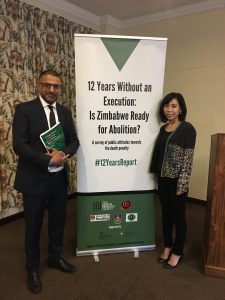Global warming is accelerating as time passes. Models predict that trend is set to continue even if we manage to rein in carbon dioxide levels in the atmosphere – but why? On World Oceans Day, Dr Paulo Ceppi explains that it’s all down to increasingly cloudless skies over the Pacific Ocean.
Rights for same-sex married couples to move around the EU confirmed in landmark ruling
Dr Alina Tryfonidou explores a landmark EU Court of Justice ruling which provides greater clarity and legal certainty for same-sex couples who get married in an EU member state, in a new post for The Conversation.
Image credit: May S Young (Flickr), CC-BY-2.0
In an historic ruling for the rights of same-sex couples, the EU Court of Justice (ECJ) has held that for the purposes of EU free movement law, the notion of a “spouse” includes the same-sex spouse of an EU citizen.
The case was referred to the ECJ from the Romanian Constitutional Court which was confronted with a dispute between a couple, Adrian Coman, a Romanian national, and Claibourn Hamilton, a US national, and the Romanian authorities. After living for a number of years in Belgium, where the couple married, Coman wished to return to Romania with his spouse. But Hamilton was refused the right to reside in Romania as Coman’s husband, on the grounds that Romania does not recognise same-sex marriage.
Emotions shape the language we use, but second languages reveal a shortcut around them
Our native language and emotions are closely woven together. Being bilingual offers an emotional detachment that can be useful for reasoning, but which also makes it easier to swear, says David Miller in a new post for The Conversation.
Image credit: Beelgin, CC-BY-2.0
A taxi driver recently cut me up on the motorway. Without hesitation, I machine-gunned a string of vulgarity at the poor man. What struck me was that every word that came out of my mouth was in Spanish. As a native speaker of English, having learned Spanish as an adult, English should have been the more readily accessible language. Yet there I was, cussing out this stranger in Mexican-accented Spanish alongside an assortment of inappropriate hand gestures.
When soil and swing collide: science at the Big Band Big Lunch
 On Sunday (3 June) the University brought together staff, students, and people in Reading for the Big Band Big Lunch. Jeremy Le Lean, communications officer of the Soil Security Programme, explains that research, like jazz, is often best with a live audience.
On Sunday (3 June) the University brought together staff, students, and people in Reading for the Big Band Big Lunch. Jeremy Le Lean, communications officer of the Soil Security Programme, explains that research, like jazz, is often best with a live audience.
As a science communicator I attend a lot of events, but not many like the University of Reading’s Big Band Big Lunch. The music and street food vendors gave it more the feeling of carnival rather than science engagement.
12 years without an execution: Is Zimbabwe ready to abolish the death penalty?
Dr Mai Sato has just published a report examining Zimbabwean citizens’ attitudes towards the death penalty in their country which concludes that public opinion needn’t pose a barrier to its abolition. She explains more in this new post for The Conversation.
At the end of 2017, the world watched with keen interest as President Robert Mugabe was deposed after 37 years of ruinous rule, and replaced by Emmerson Mnangagwa, who promised “a new democracy”.
The change of power is also significant for those interested in Zimbabwe’s death penalty policy. Mugabe, around the time of his departure from office, had plans to resume executions. Advertisements were placed to recruit a hangman – a position that had been vacant since 2005. Mnangagwa, on the other hand, has been vocal in his opposition to the death penalty. Significantly, he himself had faced the prospect of being hanged under the government of Ian Smith, against which he fought during the liberation war.
Tracking the silent changes to the UK’s biodiversity
The vast numbers and diversity of living things that populate our planet are in catastrophic decline – referred to by many scientists as Earth’s sixth mass extinction. But as Matthew Greenwell and Tom Oliver explain, it’s not only declining biodiversity we need to worry about but also genetic diversity within species.
Biodiversity loss (the decline of both the number of individuals and species from our landscapes) is happening at an alarming rate and it’s happening now.
This is a view expressed by countless environmentalists, green campaigners and scientists at ever increasing volumes. At a glance though it is hard to see what all the fuss is about. England still appears to be a green and pleasant land, with vast areas still covered in fields.
But therein lies the fundamental problem. Our current views and understanding of what the countryside should be are a far cry from what they once were and what our wildlife requires to survive into the future.
Jogging memories with sounds and pictures
It’s Dementia Action Week. Reading researchers are tackling the problem of dementia on all fronts, from investigating its causes to how we can improve care and quality of life for those it affects. Today we speak to Professor Arlene Astell, who uses sound and video to trigger long-term memories in people with dementia and get them talking again.
“People with dementia often withdraw from social interactions, lose confidence and feel embarrassed about their condition – their world shrinks. We want to find ways to stimulate their mind and memories and improve their quality of life,” explains Arlene Astell, who is Professor of Neurocognitive Disorders in Reading’s School of Psychology and Language Sciences.
“One of the questions we’re asking in our research is ‘What makes life more enjoyable for people with dementia – what are the activities and pastimes they can do that give them the same pleasure and satisfaction that they had before?’”
Arlene and colleagues are doing this through the use of technology. Working with the BBC to use their sound and TV archive they have developed touch-screen software, called the Computer Interactive Reminiscence and Conversation Aid (CIRCA). The software uses audio and video clips of evocative sounds, music and images from the past – such the whine of an electric milk float, a picture of a 1950s street scene or a recording of Winston Churchill speaking on the radio.
How Britain’s colonial legacy still affects LGBT politics around the world
Many laws across the world that make homosexuality a crime were imposed during rule by the British Empire. Joseph O’Mahoney attempts to unpick why these stigmatising laws persist in a new post for The Conversation co-authored by Enze Han.
How Ludwig Wittgenstein’s secret boyfriend helped deliver the philosopher’s seminal work
In a new post for The Conversation, John Preston looks at how the work of 20th century philosopher Ludwig Wittgenstein was shaped by his love for a young mathematician, who died in an air crash a century ago.

Ludwig Wittgenstein (Wikimedia commons)
How Big Oil distorts climate change reality with tweaks in language
The language the oil industry uses to talk about climate change has altered over time as it attempts to distance itself from culpability, says linguistics specialist Dr Sylvia Jaworska in a new post for The Conversation.






